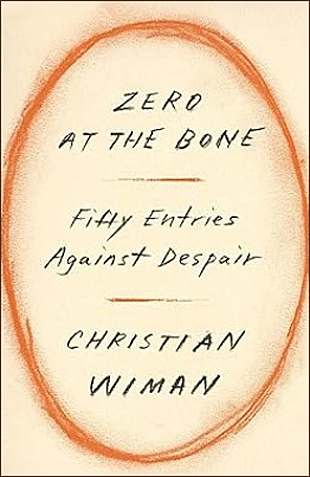“Daddy, I can’t sleep,” Christian Wiman’s young daughter says to him, early in this book, “Every time I close my eyes I’m seeing terrible things.” So Wiman encourages her to kneel and pray, but she refuses, convinced that it will do her no good. Wiman then sets out to answer such hopelessness — which, he makes clear, is a feeling he also knows well.
Wiman’s cancer diagnosis and treatments are well-known to those who have read his previous books and poems. Some of those details are here too, in a work that is part memoir, part poetry collection, part anthology, and an extended philosophical essay.
Wiman’s book is about an all-powerful God and a powerless one. Moving closer to a God who cares and fighting one who clearly doesn’t pay attention. Fifty entries or chapters explore this theme and its relation to despair. Some chapters are a single poem on a single page; others are many pages of prose. Some of these have appeared in literary journals over the last decade and are repurposed here.
The title comes from a reflection of Fanny Howe (another contemporary poet) on an Emily Dickinson poem and a teaching in the Zohar (classic text of Jewish mysticism) that says zero is another name for God, what Wiman calls “That shape without beginning or end, that emptiness that is All.” This emptiness, that is nonetheless real and active, is at the bone — meaning at the root of human life when everything is stripped away, or what Wiman calls in chapter 37 “to the bitter end.”
There are many quotations here, from writers, poets, novelists, philosophers, and they are mostly from Christian and Jewish sources. Wiman tells his own story of going from Christian to atheist to Christian again, a faith which is, for him now, clearly complicated. Chapter 46, called “My Christ,” explores these matters in detail and concludes with, “My Christ, I think, is disappointed that I still think I can think my way through such things.”
Zero at the Bone is a way to work through everyday ordinary despair that afflicts every thoughtful person, in a recumbent bicycle sort of way: lean into this apparatus, and work out. Wiman doesn’t offer what one might call “answers,” but you’ll be the better for the exercise.
Go Deeper:
Mystical Hope Today: An E-Course to reorient ourselves toward mysterious interior replenishment that is different from illusory or outcome-oriented hope.
